2024届高考英语语法第03讲冠词课件(共37张PPT)
文档属性
| 名称 | 2024届高考英语语法第03讲冠词课件(共37张PPT) |  | |
| 格式 | pptx | ||
| 文件大小 | 422.8KB | ||
| 资源类型 | 教案 | ||
| 版本资源 | 人教版(2019) | ||
| 科目 | 英语 | ||
| 更新时间 | 2023-12-05 11:32:26 | ||
图片预览

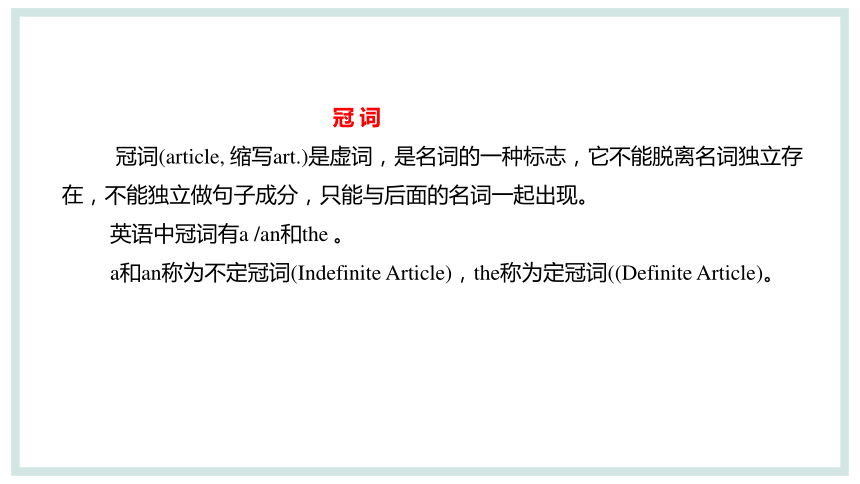
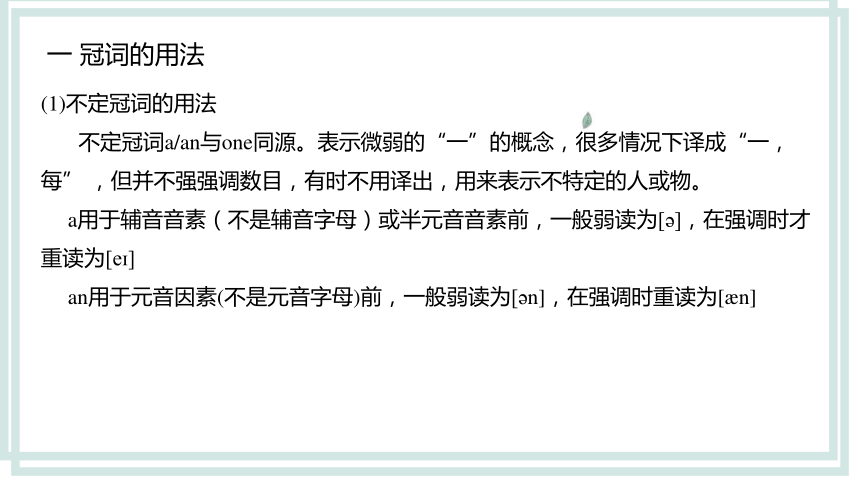
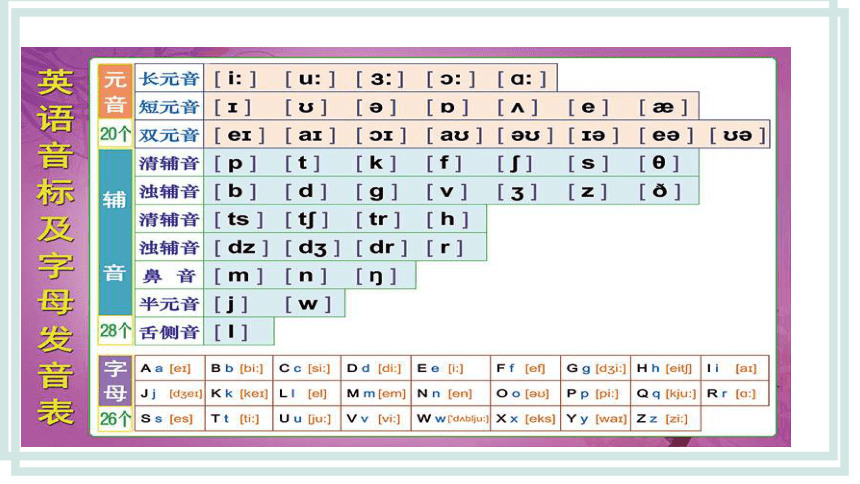
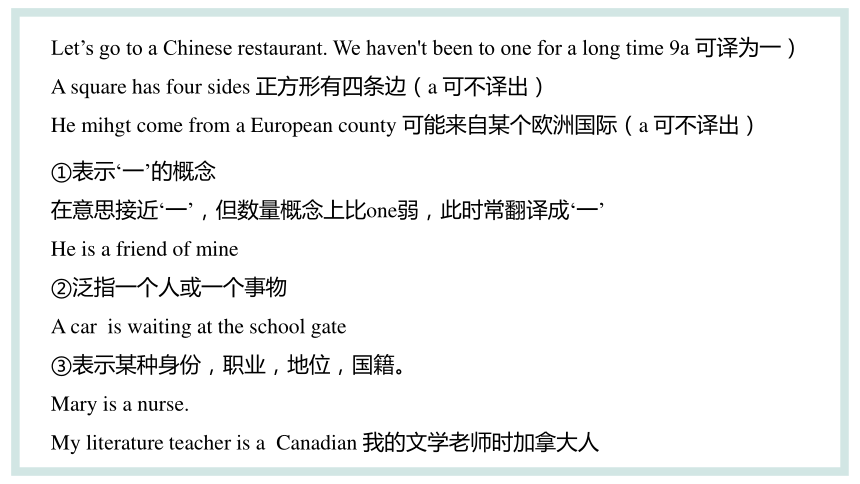
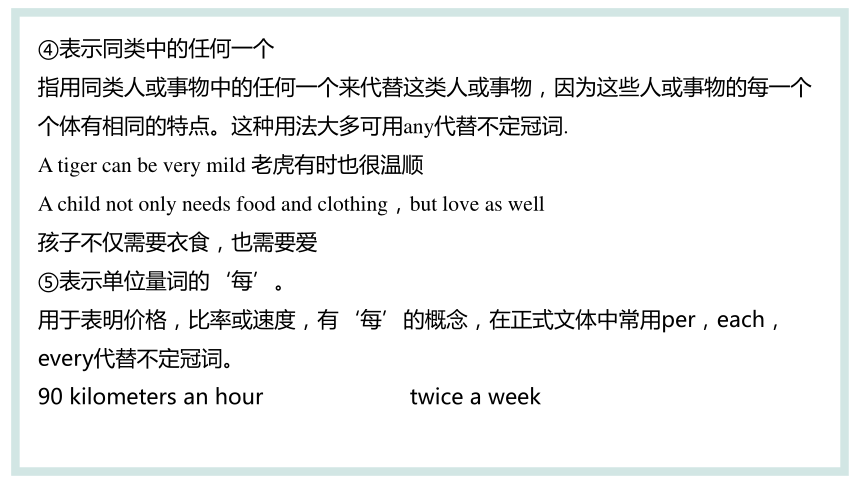
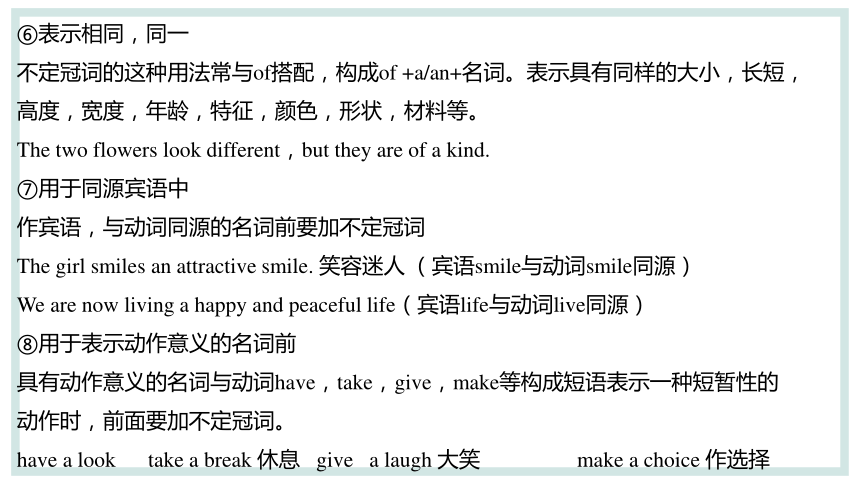
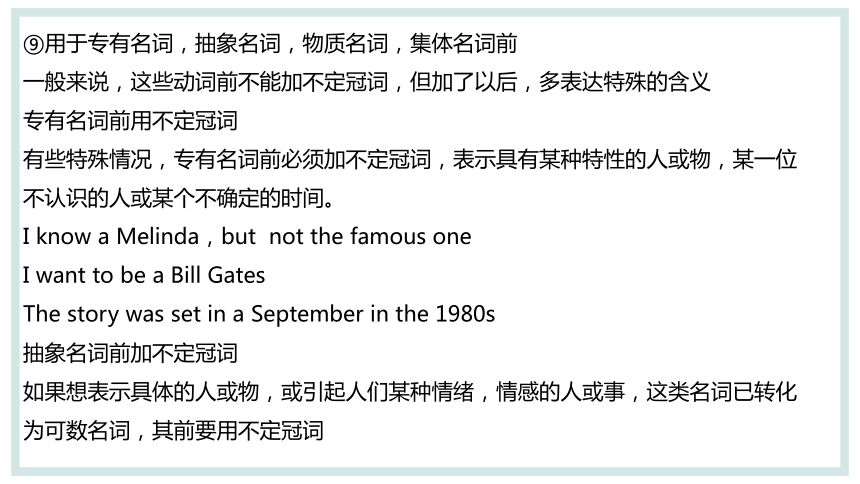
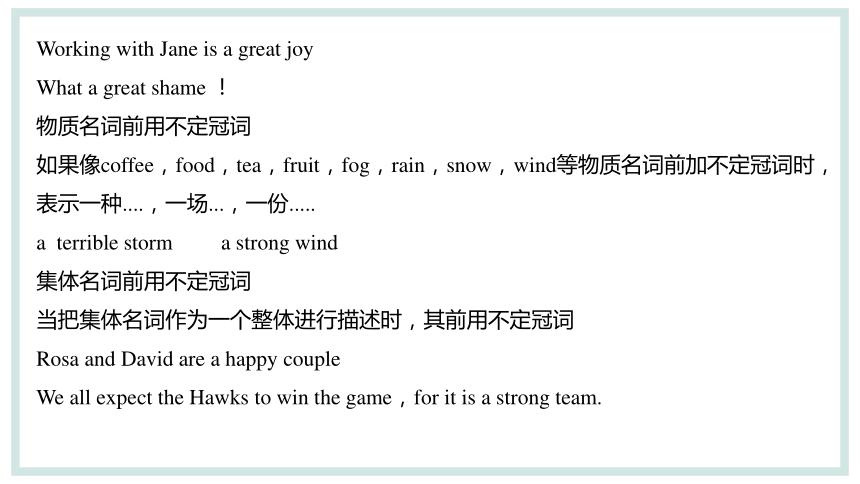
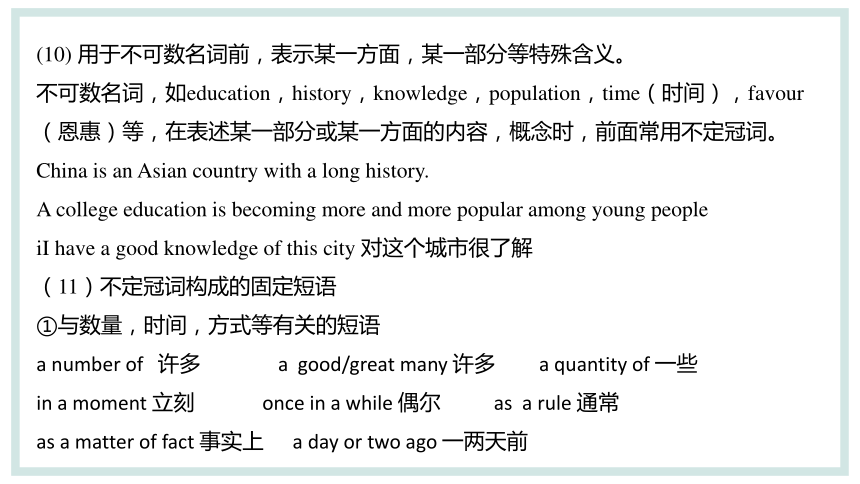
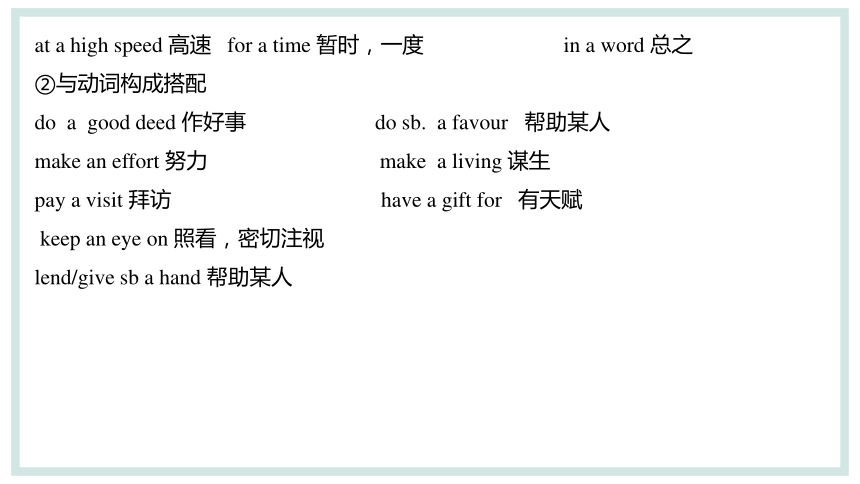
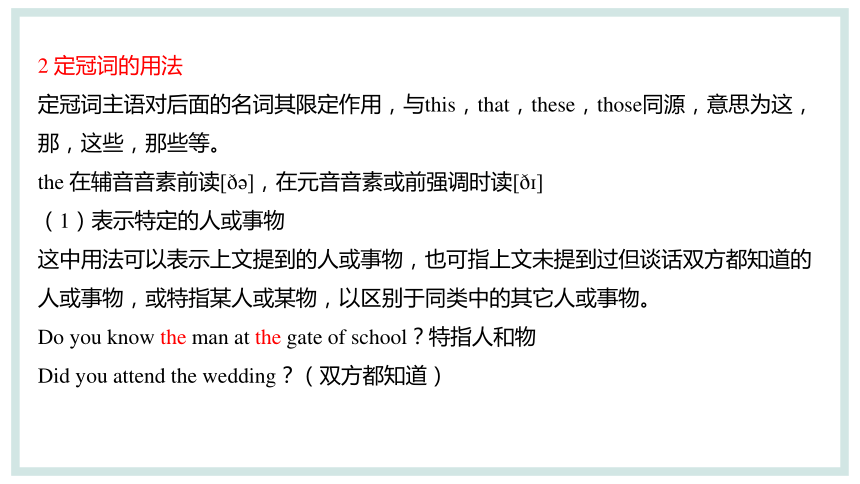
文档简介
(共37张PPT)
高中英语语法第03讲
冠 词
冠 词
冠词(article, 缩写art.)是虚词,是名词的一种标志,它不能脱离名词独立存在,不能独立做句子成分,只能与后面的名词一起出现。
英语中冠词有a /an和the 。
a和an称为不定冠词(Indefinite Article),the称为定冠词((Definite Article)。
一 冠词的用法
(1)不定冠词的用法
不定冠词a/an与one同源。表示微弱的“一”的概念,很多情况下译成“一,每” ,但并不强强调数目,有时不用译出,用来表示不特定的人或物。
a用于辅音音素(不是辅音字母)或半元音音素前,一般弱读为[ ],在强调时才重读为[e ]
an用于元音因素(不是元音字母)前,一般弱读为[ n],在强调时重读为[ n]
Let’s go to a Chinese restaurant. We haven't been to one for a long time 9a 可译为一)
A square has four sides 正方形有四条边(a 可不译出)
He mihgt come from a European county 可能来自某个欧洲国际(a 可不译出)
①表示‘一’的概念
在意思接近‘一’,但数量概念上比one弱,此时常翻译成‘一’
He is a friend of mine
②泛指一个人或一个事物
A car is waiting at the school gate
③表示某种身份,职业,地位,国籍。
Mary is a nurse.
My literature teacher is a Canadian 我的文学老师时加拿大人
④表示同类中的任何一个
指用同类人或事物中的任何一个来代替这类人或事物,因为这些人或事物的每一个个体有相同的特点。这种用法大多可用any代替不定冠词.
A tiger can be very mild 老虎有时也很温顺
A child not only needs food and clothing,but love as well
孩子不仅需要衣食,也需要爱
⑤表示单位量词的‘每’。
用于表明价格,比率或速度,有‘每’的概念,在正式文体中常用per,each,every代替不定冠词。
90 kilometers an hour twice a week
⑥表示相同,同一
不定冠词的这种用法常与of搭配,构成of +a/an+名词。表示具有同样的大小,长短,高度,宽度,年龄,特征,颜色,形状,材料等。
The two flowers look different,but they are of a kind.
⑦用于同源宾语中
作宾语,与动词同源的名词前要加不定冠词
The girl smiles an attractive smile. 笑容迷人 (宾语smile与动词smile同源)
We are now living a happy and peaceful life(宾语life与动词live同源)
⑧用于表示动作意义的名词前
具有动作意义的名词与动词have,take,give,make等构成短语表示一种短暂性的动作时,前面要加不定冠词。
have a look take a break 休息 give a laugh 大笑 make a choice 作选择
⑨用于专有名词,抽象名词,物质名词,集体名词前
一般来说,这些动词前不能加不定冠词,但加了以后,多表达特殊的含义
专有名词前用不定冠词
有些特殊情况,专有名词前必须加不定冠词,表示具有某种特性的人或物,某一位不认识的人或某个不确定的时间。
I know a Melinda,but not the famous one
I want to be a Bill Gates
The story was set in a September in the 1980s
抽象名词前加不定冠词
如果想表示具体的人或物,或引起人们某种情绪,情感的人或事,这类名词已转化为可数名词,其前要用不定冠词
Working with Jane is a great joy
What a great shame !
物质名词前用不定冠词
如果像coffee,food,tea,fruit,fog,rain,snow,wind等物质名词前加不定冠词时,表示一种....,一场...,一份.....
a terrible storm a strong wind
集体名词前用不定冠词
当把集体名词作为一个整体进行描述时,其前用不定冠词
Rosa and David are a happy couple
We all expect the Hawks to win the game,for it is a strong team.
(10) 用于不可数名词前,表示某一方面,某一部分等特殊含义。
不可数名词,如education,history,knowledge,population,time(时间),favour(恩惠)等,在表述某一部分或某一方面的内容,概念时,前面常用不定冠词。
China is an Asian country with a long history.
A college education is becoming more and more popular among young people
iI have a good knowledge of this city 对这个城市很了解
(11)不定冠词构成的固定短语
①与数量,时间,方式等有关的短语
a number of 许多 a good/great many 许多 a quantity of 一些
in a moment 立刻 once in a while 偶尔 as a rule 通常
as a matter of fact 事实上 a day or two ago 一两天前
at a high speed 高速 for a time 暂时,一度 in a word 总之
②与动词构成搭配
do a good deed 作好事 do sb. a favour 帮助某人
make an effort 努力 make a living 谋生
pay a visit 拜访 have a gift for 有天赋
keep an eye on 照看,密切注视
lend/give sb a hand 帮助某人
2 定冠词的用法
定冠词主语对后面的名词其限定作用,与this,that,these,those同源,意思为这,那,这些,那些等。
the 在辅音音素前读[ ],在元音音素或前强调时读[ ]
(1)表示特定的人或事物
这中用法可以表示上文提到的人或事物,也可指上文未提到过但谈话双方都知道的人或事物,或特指某人或某物,以区别于同类中的其它人或事物。
Do you know the man at the gate of school?特指人和物
Did you attend the wedding?(双方都知道)
(2)与单数名词连用,表示具有某种特点的某类人或事物
The computer revolutionized office work
The responsible teacher should be encouraging and motivating
(3)与某些表示国籍的形容词连用,泛指这个国家的全体人员
这种结构如果在句子中作主语,谓语动词常用复数
Most of the British are somewhat conservative 大多数英国人有点保守
The Chinese eat with chopsticks
(4)与自然界中独一无二的事物连用
the sun the moon the earth the Equator 赤道 the solar system 太阳系 the North Pole 北极
teh tropics 热带地区 teh Mars 火星
(5)与日常生活中大家熟悉的事物连用
Turn off the water supply before you leave
I will go to post office to have all these cards posted
(6)与某些专有名词连用,如江河,海洋,海峡,海湾,山脉,群岛,国家,地区,组织,机构,学校,建筑物,报纸,杂志等
the Yellow Rive 黄河 the Arctic Ocean 北冰洋
the English Channel 英吉利海峡 the Qiongzhou Strait 琼州海峡
the Alps 阿尔卑斯山脉 the Philippines 菲律宾全岛
the Middle East 中东 the House of Commons 众议院
the University of Cambridge 剑桥大学
the Mirror 镜报 the Economist 经济学家杂志
【注意】个别杂志或报纸前也有不用定冠词的,如:
Fortune 财富 Reader’s Digest 读者文摘
USA Today 今日美国 China Daily 中国日报
(7)用于某些由普通名词构成的专有名词前
the Great Wall 长城 the Milky Way 银河
the Silk Road 丝绸之路 the Great Lakes 北美洲五大湖
(8)用于姓氏的复数形式前面,表示全家人或夫妇两个
The Greens 格林全家或格林夫妇
(9)用于表示特指的抽象名词,物质名词,特别是其后有限制性定语修饰时
The three children are the joy of my life .
The warmth of the sweater is determined by the wool of it used
(10) 用于逢十的数词前,表示世纪的某个年代
in the 1990’s 20世纪90年代
The war broke out in the sixties 战争爆于60年代
(11)用于某些表示方向,方位,时间,方式等的固定结构中
at the corner at the market at the age of at the end 在末尾
at the bottom of at the very start in the east in the end 最终
in the middle of on the right 在右边 on the air 正在广播
on the way on the whole 整体上 from the west
from the behind 从后面 to the left 朝左边
to the full 达到最大程度 to the east of 在...的东方
(12)用于形容词的比较级和最高级
the 用于比较级前,特指两者中的较....的一个
He lives the larger of the two rooms
Of all the boys,Alan is the best student who speaks English
副词最高级前的the 可省略
Mary always talks(the)most and does(the)least
(13)用于序数词或其它表示顺序的词前
He was the first president of the US
Laura was the last person to arrive
序数词前面也可加不定冠词,但不表示顺序的意义,而是表再一,又一的意思
Try a second time and you will succeed
(14)用于the+比较级,the +比较级结构中,表示越....就越.....
The more careful you are,the fewer mistakes you will make
(15)用于名词化的形容词或分词前
有些形容词或分词前面加the,相当于一个名词,可表示一类人,事物或抽象概念
the young 年轻人 the wounder 伤员 受伤的人
The new is to take the place of the old 新事物总会代替旧事物
(16)用于被演奏的西洋乐器前
Let’s dance to the piano
(17)用于固定结构:动词+sb.+介词+the +身体部分
常见的此类动词有take,catch,hold,seize,pull,hit,cut,strike,pat,lead等
The woman hit the man in the face,and the man struck her on the back.
The boss pulled the boy by the air
The headmaster patted the pupil on the shoulder to make him relax
这类结构常用的介词有by,in ,on等。一般情况下,
表示抓住,领着某一部位(arm,hand)用介词by,
表示击中,拍打较硬且突出的部位(back,head等)用on,
表示相对较软,陷入的部位(stomach,face等)用in。
(18)用于by+the+计量单位名词结构中
by the pound 按磅 by the foot 按英尺 by the hour 按小时
by+the+名词结构中的名词如果不是表示度量的名词,则用in+名词的结构
China is the largest country in population,while Russia is the largest in area
Henry is six feet in height.
(19)与few,little,many,other,majority,minority等连用表示特定的数量
The many are working hard for the few 大多数人正为少数人工作
We have already done the little that we can 我们已经做了我们能做的一点事情
We are in the minority,and more people are against us than with us
我们成了少数派,反对我们的人比支持我们的人多。
(20)用于固定短语中
all the best 一切顺利 under the leadership of
over the radio 通过无线电 with the help of
3 不用冠词的情况
(1)物质名词表示泛指时
Plastic is hard to break up
This sweater is made of pure wool.
(2) 抽象名词前
Music is a universal language which can bring people pleasure
(3)表示人名,地名,国名和词首为Mount的山即大多数湖泊的专有名词前
China is one of the largest countries in the world
We are going to climb Mount Tai tomorrow
Kawabata (川端康成)is a famous Japanese writer.
注意:专有名词表示某一个特定的人或物时,其前加定冠词
China is not the China that it was sixty years ago
专有名词表示某一概念时,其前加不定冠词
A Mr Smith called you yesterday 一个叫史密斯的先生给你打电话了
(4)个体名词抽象化时
一些个体名词,原本是可数名词,但当改个体名词不指具体的事物而表示抽象的含义时,其前不加任何冠词
Where did you go to university?你在哪里上的大学?
It is harmful to your eyes when youread in bed.
(5)表示季节,月份,日期的名词
Spring is the best season of the year.
He starts working there in March
当谈论具体的季节,日期和中国传统节日时常用定冠词
I don not like the spring of Beijing. It is too sandy.
The Mid-autumn Day,the Spring Festival and the Lantern Festival are the three important traditional Chinese festivals
(6)在dawn,daybreak,dusk,sunrise,noon,midday,sunset,midnight等词前
At sunrise,we got up early. At sunset,we arrived at that village.
At noon,the temperature rose.
表示具体意义时,这些词前可以加冠词
We climbed to the top of Mount Tai to see the sunrise。
We can not see very far in the dusk.
(7)表示三餐,球类运动的名词前
Father and I take turns cooking lunch。
It calls for skills to play bowling well
当三餐前由形容词修饰或特指某顿饭时,可用冠词
I had a quick breakfast and rushed to work
We very much enjoyed the lucn you offered.
(8)表示学科,语言的名词前
We are going to take up chemistry this semester
He speaks Chinese very well
当表示语言的词语后面加上language一词时,前面要加定冠词the
The English language is universally used.
(9) 表示独一无二的职位,头衔的名词在句子中作表语,补足语,同位语时
He has been head of history department for ten years.
He was elected president of the company.
This is Mr. White,director of the Department of African Affairs.这是非洲司司长
该类名词表示具体的人时,其前需要用冠词.
The president is visiting China.
(10)表示一类人或事物的可数名词复数形式前
Teachers should encouage students to ask more questions
(11)表示方式的by后跟的名词前
by hand 手工 by air 乘飞机 by water 坐船
表示交通工具的名词前若不是加在介词by后,则名词前通常需要冠词,物主代词,
指示代词等修饰
on the bus Iwill come on my bus.
(12)as/though引导的让步状语从句中被前置的作表语的名词前
as/though引导的让步状语从句中,作表语的名词或有形容词修饰的名词放在句首,名词前不用冠词
Girl as /though she is,Mary has managed to swim across the river
Expensive bool as it is,I have made up my mind to buy it.
(13)由and 连接,表示由两部分或两种身份组成的一个事物或人,第二个名词前不用冠词,但如果是表示两种事物或两个人,两个名词前都要用冠词.
a black and white cat 黑白相间的猫
a black and a white cat 一只黑猫和一只白猫
(14)系动词turn后面作表语的名词前不用冠词,但有形容词修饰时通常要加冠词
Upon graduation, my cousin turned clerk in ca bank.
She turned a famous singer finally.
(15)man 泛指人类时
Man can save the earth;man can destroy the earth.
(16)单数名词相对性使用时
介词或连词连接的两个相对,相同或关系密切的名词构成的一些固定短语中常不用冠词.
day and night 日日夜夜 day and day 日复一日
day by day 一天天地 face to face 面对面
hand in hand 手拉手 heart ans soul 全心全意地
husband and wife 夫妇 shoulder and shoulder 肩并肩地
side by side 肩并肩地 from time to time 不时地
(17)与时间,地点,方式或状态等有关的一些短语中
at Christmas 在圣诞节 at college 在上大学 at dark 在天黑时
at dawn 在黎明时 at dinner 在吃饭 at home在家
at peace 处于和平状态 after school放学后 by birth 在血统上,生来
by chance 偶然 in action 在行动中 in addition 另外
in advacne 提前 in good condition 情况良好
in good order 有条不紊 for sale 待售 for security 安全起见
go to bed 上床睡觉 go to school 上学 go to college 上大学
on board 在 船上 on business 因公 on camera 出现在电视上
on campus 在校园内 in public 公开地
with difficulty 困难地 with ease 轻而易举地 with effect 有效地
by mistake 错误地 in silence 沉默地
(18)有些动词短语中习惯上不用冠词
ask for advice ask for help ask for trouble 找麻烦
catch fire 着火 catch hold of 抓住 come back to life 苏醒
come to/into power 掌权 catch sight of 无意中看见 do good to 对...有好处
do harm to 对...有害处 do wrong to 冤枉 have sports 进行运动
get hold of 抓住 keep...in mind 牢记 lose heart 失去信心
learn...by heart 背诵 lose 减肥 pay attention to
keep in touch with 与...保持联系
have difficulty/trouble (in) doing sth 做某事有困难/有麻烦
4. 冠词的省略
(1)新闻标题,书名,电影名,歌曲名等名词前常省略冠词
文章的题目,新闻标题,广告语,书名,歌曲名,电报中,在不引起歧义的情况下,冠词可不用,从而使行文更加简明
(A)Full Furnished Flat to Let 出租全新装修公寓(广告)
Over 10 People Killed in (the)Earthquake Last Night (新闻标题)
(2)通知,说明中常省略冠词
(The)Lift (is)out of order
Cut along (the)dotted line 沿着虚线剪
(The) Door (is)blocked 门被阻
(3)部分对称或并列名词前冠词省略
①两个并列名词前都有冠词时,第二个名词前的冠词可省略
Leslie works in a company or (a)factory in our city
②某些对称结构中常省略冠词
from (the)east to (the)west
from(the)morining to (the)night
from(the)beginning to (the)end
(4) 序数词前定冠词的省略
①月,日表达中的冠词可省略
January (the)first July (the)fourth
②并列的序数词中后面的冠词可以省略
the first and (the)last chapter
the twentieth and (the)twenty-first centuries
有时第二个序数词不加the表示同一个人或事物,注意结合语境判断表达何种意义。
the third and last chapter 第三章,也就是最后一章
the third and the last chapter 第三章和最后一章
③在某些动词短语中,序数词前的冠词常省略
take(the)first prize come out (the)first 获得第一名 win (the)first
5 冠词的位置
① 冠词用于名词前
一般来说,冠词用于一个名词或名词短语的前面
an honest person 一个诚实的人 the happiest time z最幸福的时光
②as/so/too...结构中的冠词
在这种结构中,冠词一般放于as/so/too修饰的形容词的后面
She is not so smart a girl as I thought.
Mary is too young a girl to be left by herself at home 太小不能独自被留在家里
③ such....结构中的冠词
such修饰单数可数名词时,冠词放于such后,若该单数可数名词还有其它形容词修饰,则不冠词置于such后另一个形容词前。
such a difficult situation such a warm-hearted teacher
④ rather quite修饰的名词短语中的冠词
在有rather,quite修饰的名词短语中,冠词位于rather,quite的后面
rather/quite a comfortable house
rather/quite a fashionable hat
在quite/rather a few,quite/rather a little等短语中,a few,a little时固定短语,不可拆分成a quite/rather few,a quite/rather little
⑤what引导的感叹句中的冠词
不定冠词置于what之后,名词的其它修饰语之前
What a splendid performance you gave us!
What a horrible thing to do!
⑥how引导的感叹句中的冠词
不定冠词置于how修饰的形容词后,可数名词单数前
How challengeing a task it is to go through the forest within half a month!
⑦ 名词前有all,both,double等修饰时,冠词应位于其后,名词之前
All the information is true
Both the parents are interested in music
I offered him double the amout,but he still refused.
6 冠词有无意不同
by day 在白天 by the day 按天计算
in front of 在...外部的前面 in the front of 在...内部的前面
in hospital 住院 in the hospital 在医院(住院或工作)
in charge of 负责,管理 in the charge of 由....负责,由....管理
in prison 坐牢 in the prison 在监狱
in bed 在睡觉 in the bed 在床上
in class 在上课 in the class 在班里
in office 执政 in the office 在办公室里
sit at table 坐下吃饭 sit at the table 坐在桌旁
go to sea 当水手 go to the sea 到海边去
go to school上学 go to the school 去学校
go to church 做礼拜 go to the church 去教堂
go to bed 睡觉 go to the bed 去床边
go to prison 入狱 go to the prison 去监狱
live on farm 务农 live on the farm 住在农场
leave school 辍学 leave the school 离校
out of question 毫无疑问 out of the question 不可能
two of us 我们中的两个人 the two of us 就我们两人
高中英语语法第03讲
冠 词
冠 词
冠词(article, 缩写art.)是虚词,是名词的一种标志,它不能脱离名词独立存在,不能独立做句子成分,只能与后面的名词一起出现。
英语中冠词有a /an和the 。
a和an称为不定冠词(Indefinite Article),the称为定冠词((Definite Article)。
一 冠词的用法
(1)不定冠词的用法
不定冠词a/an与one同源。表示微弱的“一”的概念,很多情况下译成“一,每” ,但并不强强调数目,有时不用译出,用来表示不特定的人或物。
a用于辅音音素(不是辅音字母)或半元音音素前,一般弱读为[ ],在强调时才重读为[e ]
an用于元音因素(不是元音字母)前,一般弱读为[ n],在强调时重读为[ n]
Let’s go to a Chinese restaurant. We haven't been to one for a long time 9a 可译为一)
A square has four sides 正方形有四条边(a 可不译出)
He mihgt come from a European county 可能来自某个欧洲国际(a 可不译出)
①表示‘一’的概念
在意思接近‘一’,但数量概念上比one弱,此时常翻译成‘一’
He is a friend of mine
②泛指一个人或一个事物
A car is waiting at the school gate
③表示某种身份,职业,地位,国籍。
Mary is a nurse.
My literature teacher is a Canadian 我的文学老师时加拿大人
④表示同类中的任何一个
指用同类人或事物中的任何一个来代替这类人或事物,因为这些人或事物的每一个个体有相同的特点。这种用法大多可用any代替不定冠词.
A tiger can be very mild 老虎有时也很温顺
A child not only needs food and clothing,but love as well
孩子不仅需要衣食,也需要爱
⑤表示单位量词的‘每’。
用于表明价格,比率或速度,有‘每’的概念,在正式文体中常用per,each,every代替不定冠词。
90 kilometers an hour twice a week
⑥表示相同,同一
不定冠词的这种用法常与of搭配,构成of +a/an+名词。表示具有同样的大小,长短,高度,宽度,年龄,特征,颜色,形状,材料等。
The two flowers look different,but they are of a kind.
⑦用于同源宾语中
作宾语,与动词同源的名词前要加不定冠词
The girl smiles an attractive smile. 笑容迷人 (宾语smile与动词smile同源)
We are now living a happy and peaceful life(宾语life与动词live同源)
⑧用于表示动作意义的名词前
具有动作意义的名词与动词have,take,give,make等构成短语表示一种短暂性的动作时,前面要加不定冠词。
have a look take a break 休息 give a laugh 大笑 make a choice 作选择
⑨用于专有名词,抽象名词,物质名词,集体名词前
一般来说,这些动词前不能加不定冠词,但加了以后,多表达特殊的含义
专有名词前用不定冠词
有些特殊情况,专有名词前必须加不定冠词,表示具有某种特性的人或物,某一位不认识的人或某个不确定的时间。
I know a Melinda,but not the famous one
I want to be a Bill Gates
The story was set in a September in the 1980s
抽象名词前加不定冠词
如果想表示具体的人或物,或引起人们某种情绪,情感的人或事,这类名词已转化为可数名词,其前要用不定冠词
Working with Jane is a great joy
What a great shame !
物质名词前用不定冠词
如果像coffee,food,tea,fruit,fog,rain,snow,wind等物质名词前加不定冠词时,表示一种....,一场...,一份.....
a terrible storm a strong wind
集体名词前用不定冠词
当把集体名词作为一个整体进行描述时,其前用不定冠词
Rosa and David are a happy couple
We all expect the Hawks to win the game,for it is a strong team.
(10) 用于不可数名词前,表示某一方面,某一部分等特殊含义。
不可数名词,如education,history,knowledge,population,time(时间),favour(恩惠)等,在表述某一部分或某一方面的内容,概念时,前面常用不定冠词。
China is an Asian country with a long history.
A college education is becoming more and more popular among young people
iI have a good knowledge of this city 对这个城市很了解
(11)不定冠词构成的固定短语
①与数量,时间,方式等有关的短语
a number of 许多 a good/great many 许多 a quantity of 一些
in a moment 立刻 once in a while 偶尔 as a rule 通常
as a matter of fact 事实上 a day or two ago 一两天前
at a high speed 高速 for a time 暂时,一度 in a word 总之
②与动词构成搭配
do a good deed 作好事 do sb. a favour 帮助某人
make an effort 努力 make a living 谋生
pay a visit 拜访 have a gift for 有天赋
keep an eye on 照看,密切注视
lend/give sb a hand 帮助某人
2 定冠词的用法
定冠词主语对后面的名词其限定作用,与this,that,these,those同源,意思为这,那,这些,那些等。
the 在辅音音素前读[ ],在元音音素或前强调时读[ ]
(1)表示特定的人或事物
这中用法可以表示上文提到的人或事物,也可指上文未提到过但谈话双方都知道的人或事物,或特指某人或某物,以区别于同类中的其它人或事物。
Do you know the man at the gate of school?特指人和物
Did you attend the wedding?(双方都知道)
(2)与单数名词连用,表示具有某种特点的某类人或事物
The computer revolutionized office work
The responsible teacher should be encouraging and motivating
(3)与某些表示国籍的形容词连用,泛指这个国家的全体人员
这种结构如果在句子中作主语,谓语动词常用复数
Most of the British are somewhat conservative 大多数英国人有点保守
The Chinese eat with chopsticks
(4)与自然界中独一无二的事物连用
the sun the moon the earth the Equator 赤道 the solar system 太阳系 the North Pole 北极
teh tropics 热带地区 teh Mars 火星
(5)与日常生活中大家熟悉的事物连用
Turn off the water supply before you leave
I will go to post office to have all these cards posted
(6)与某些专有名词连用,如江河,海洋,海峡,海湾,山脉,群岛,国家,地区,组织,机构,学校,建筑物,报纸,杂志等
the Yellow Rive 黄河 the Arctic Ocean 北冰洋
the English Channel 英吉利海峡 the Qiongzhou Strait 琼州海峡
the Alps 阿尔卑斯山脉 the Philippines 菲律宾全岛
the Middle East 中东 the House of Commons 众议院
the University of Cambridge 剑桥大学
the Mirror 镜报 the Economist 经济学家杂志
【注意】个别杂志或报纸前也有不用定冠词的,如:
Fortune 财富 Reader’s Digest 读者文摘
USA Today 今日美国 China Daily 中国日报
(7)用于某些由普通名词构成的专有名词前
the Great Wall 长城 the Milky Way 银河
the Silk Road 丝绸之路 the Great Lakes 北美洲五大湖
(8)用于姓氏的复数形式前面,表示全家人或夫妇两个
The Greens 格林全家或格林夫妇
(9)用于表示特指的抽象名词,物质名词,特别是其后有限制性定语修饰时
The three children are the joy of my life .
The warmth of the sweater is determined by the wool of it used
(10) 用于逢十的数词前,表示世纪的某个年代
in the 1990’s 20世纪90年代
The war broke out in the sixties 战争爆于60年代
(11)用于某些表示方向,方位,时间,方式等的固定结构中
at the corner at the market at the age of at the end 在末尾
at the bottom of at the very start in the east in the end 最终
in the middle of on the right 在右边 on the air 正在广播
on the way on the whole 整体上 from the west
from the behind 从后面 to the left 朝左边
to the full 达到最大程度 to the east of 在...的东方
(12)用于形容词的比较级和最高级
the 用于比较级前,特指两者中的较....的一个
He lives the larger of the two rooms
Of all the boys,Alan is the best student who speaks English
副词最高级前的the 可省略
Mary always talks(the)most and does(the)least
(13)用于序数词或其它表示顺序的词前
He was the first president of the US
Laura was the last person to arrive
序数词前面也可加不定冠词,但不表示顺序的意义,而是表再一,又一的意思
Try a second time and you will succeed
(14)用于the+比较级,the +比较级结构中,表示越....就越.....
The more careful you are,the fewer mistakes you will make
(15)用于名词化的形容词或分词前
有些形容词或分词前面加the,相当于一个名词,可表示一类人,事物或抽象概念
the young 年轻人 the wounder 伤员 受伤的人
The new is to take the place of the old 新事物总会代替旧事物
(16)用于被演奏的西洋乐器前
Let’s dance to the piano
(17)用于固定结构:动词+sb.+介词+the +身体部分
常见的此类动词有take,catch,hold,seize,pull,hit,cut,strike,pat,lead等
The woman hit the man in the face,and the man struck her on the back.
The boss pulled the boy by the air
The headmaster patted the pupil on the shoulder to make him relax
这类结构常用的介词有by,in ,on等。一般情况下,
表示抓住,领着某一部位(arm,hand)用介词by,
表示击中,拍打较硬且突出的部位(back,head等)用on,
表示相对较软,陷入的部位(stomach,face等)用in。
(18)用于by+the+计量单位名词结构中
by the pound 按磅 by the foot 按英尺 by the hour 按小时
by+the+名词结构中的名词如果不是表示度量的名词,则用in+名词的结构
China is the largest country in population,while Russia is the largest in area
Henry is six feet in height.
(19)与few,little,many,other,majority,minority等连用表示特定的数量
The many are working hard for the few 大多数人正为少数人工作
We have already done the little that we can 我们已经做了我们能做的一点事情
We are in the minority,and more people are against us than with us
我们成了少数派,反对我们的人比支持我们的人多。
(20)用于固定短语中
all the best 一切顺利 under the leadership of
over the radio 通过无线电 with the help of
3 不用冠词的情况
(1)物质名词表示泛指时
Plastic is hard to break up
This sweater is made of pure wool.
(2) 抽象名词前
Music is a universal language which can bring people pleasure
(3)表示人名,地名,国名和词首为Mount的山即大多数湖泊的专有名词前
China is one of the largest countries in the world
We are going to climb Mount Tai tomorrow
Kawabata (川端康成)is a famous Japanese writer.
注意:专有名词表示某一个特定的人或物时,其前加定冠词
China is not the China that it was sixty years ago
专有名词表示某一概念时,其前加不定冠词
A Mr Smith called you yesterday 一个叫史密斯的先生给你打电话了
(4)个体名词抽象化时
一些个体名词,原本是可数名词,但当改个体名词不指具体的事物而表示抽象的含义时,其前不加任何冠词
Where did you go to university?你在哪里上的大学?
It is harmful to your eyes when youread in bed.
(5)表示季节,月份,日期的名词
Spring is the best season of the year.
He starts working there in March
当谈论具体的季节,日期和中国传统节日时常用定冠词
I don not like the spring of Beijing. It is too sandy.
The Mid-autumn Day,the Spring Festival and the Lantern Festival are the three important traditional Chinese festivals
(6)在dawn,daybreak,dusk,sunrise,noon,midday,sunset,midnight等词前
At sunrise,we got up early. At sunset,we arrived at that village.
At noon,the temperature rose.
表示具体意义时,这些词前可以加冠词
We climbed to the top of Mount Tai to see the sunrise。
We can not see very far in the dusk.
(7)表示三餐,球类运动的名词前
Father and I take turns cooking lunch。
It calls for skills to play bowling well
当三餐前由形容词修饰或特指某顿饭时,可用冠词
I had a quick breakfast and rushed to work
We very much enjoyed the lucn you offered.
(8)表示学科,语言的名词前
We are going to take up chemistry this semester
He speaks Chinese very well
当表示语言的词语后面加上language一词时,前面要加定冠词the
The English language is universally used.
(9) 表示独一无二的职位,头衔的名词在句子中作表语,补足语,同位语时
He has been head of history department for ten years.
He was elected president of the company.
This is Mr. White,director of the Department of African Affairs.这是非洲司司长
该类名词表示具体的人时,其前需要用冠词.
The president is visiting China.
(10)表示一类人或事物的可数名词复数形式前
Teachers should encouage students to ask more questions
(11)表示方式的by后跟的名词前
by hand 手工 by air 乘飞机 by water 坐船
表示交通工具的名词前若不是加在介词by后,则名词前通常需要冠词,物主代词,
指示代词等修饰
on the bus Iwill come on my bus.
(12)as/though引导的让步状语从句中被前置的作表语的名词前
as/though引导的让步状语从句中,作表语的名词或有形容词修饰的名词放在句首,名词前不用冠词
Girl as /though she is,Mary has managed to swim across the river
Expensive bool as it is,I have made up my mind to buy it.
(13)由and 连接,表示由两部分或两种身份组成的一个事物或人,第二个名词前不用冠词,但如果是表示两种事物或两个人,两个名词前都要用冠词.
a black and white cat 黑白相间的猫
a black and a white cat 一只黑猫和一只白猫
(14)系动词turn后面作表语的名词前不用冠词,但有形容词修饰时通常要加冠词
Upon graduation, my cousin turned clerk in ca bank.
She turned a famous singer finally.
(15)man 泛指人类时
Man can save the earth;man can destroy the earth.
(16)单数名词相对性使用时
介词或连词连接的两个相对,相同或关系密切的名词构成的一些固定短语中常不用冠词.
day and night 日日夜夜 day and day 日复一日
day by day 一天天地 face to face 面对面
hand in hand 手拉手 heart ans soul 全心全意地
husband and wife 夫妇 shoulder and shoulder 肩并肩地
side by side 肩并肩地 from time to time 不时地
(17)与时间,地点,方式或状态等有关的一些短语中
at Christmas 在圣诞节 at college 在上大学 at dark 在天黑时
at dawn 在黎明时 at dinner 在吃饭 at home在家
at peace 处于和平状态 after school放学后 by birth 在血统上,生来
by chance 偶然 in action 在行动中 in addition 另外
in advacne 提前 in good condition 情况良好
in good order 有条不紊 for sale 待售 for security 安全起见
go to bed 上床睡觉 go to school 上学 go to college 上大学
on board 在 船上 on business 因公 on camera 出现在电视上
on campus 在校园内 in public 公开地
with difficulty 困难地 with ease 轻而易举地 with effect 有效地
by mistake 错误地 in silence 沉默地
(18)有些动词短语中习惯上不用冠词
ask for advice ask for help ask for trouble 找麻烦
catch fire 着火 catch hold of 抓住 come back to life 苏醒
come to/into power 掌权 catch sight of 无意中看见 do good to 对...有好处
do harm to 对...有害处 do wrong to 冤枉 have sports 进行运动
get hold of 抓住 keep...in mind 牢记 lose heart 失去信心
learn...by heart 背诵 lose 减肥 pay attention to
keep in touch with 与...保持联系
have difficulty/trouble (in) doing sth 做某事有困难/有麻烦
4. 冠词的省略
(1)新闻标题,书名,电影名,歌曲名等名词前常省略冠词
文章的题目,新闻标题,广告语,书名,歌曲名,电报中,在不引起歧义的情况下,冠词可不用,从而使行文更加简明
(A)Full Furnished Flat to Let 出租全新装修公寓(广告)
Over 10 People Killed in (the)Earthquake Last Night (新闻标题)
(2)通知,说明中常省略冠词
(The)Lift (is)out of order
Cut along (the)dotted line 沿着虚线剪
(The) Door (is)blocked 门被阻
(3)部分对称或并列名词前冠词省略
①两个并列名词前都有冠词时,第二个名词前的冠词可省略
Leslie works in a company or (a)factory in our city
②某些对称结构中常省略冠词
from (the)east to (the)west
from(the)morining to (the)night
from(the)beginning to (the)end
(4) 序数词前定冠词的省略
①月,日表达中的冠词可省略
January (the)first July (the)fourth
②并列的序数词中后面的冠词可以省略
the first and (the)last chapter
the twentieth and (the)twenty-first centuries
有时第二个序数词不加the表示同一个人或事物,注意结合语境判断表达何种意义。
the third and last chapter 第三章,也就是最后一章
the third and the last chapter 第三章和最后一章
③在某些动词短语中,序数词前的冠词常省略
take(the)first prize come out (the)first 获得第一名 win (the)first
5 冠词的位置
① 冠词用于名词前
一般来说,冠词用于一个名词或名词短语的前面
an honest person 一个诚实的人 the happiest time z最幸福的时光
②as/so/too...结构中的冠词
在这种结构中,冠词一般放于as/so/too修饰的形容词的后面
She is not so smart a girl as I thought.
Mary is too young a girl to be left by herself at home 太小不能独自被留在家里
③ such....结构中的冠词
such修饰单数可数名词时,冠词放于such后,若该单数可数名词还有其它形容词修饰,则不冠词置于such后另一个形容词前。
such a difficult situation such a warm-hearted teacher
④ rather quite修饰的名词短语中的冠词
在有rather,quite修饰的名词短语中,冠词位于rather,quite的后面
rather/quite a comfortable house
rather/quite a fashionable hat
在quite/rather a few,quite/rather a little等短语中,a few,a little时固定短语,不可拆分成a quite/rather few,a quite/rather little
⑤what引导的感叹句中的冠词
不定冠词置于what之后,名词的其它修饰语之前
What a splendid performance you gave us!
What a horrible thing to do!
⑥how引导的感叹句中的冠词
不定冠词置于how修饰的形容词后,可数名词单数前
How challengeing a task it is to go through the forest within half a month!
⑦ 名词前有all,both,double等修饰时,冠词应位于其后,名词之前
All the information is true
Both the parents are interested in music
I offered him double the amout,but he still refused.
6 冠词有无意不同
by day 在白天 by the day 按天计算
in front of 在...外部的前面 in the front of 在...内部的前面
in hospital 住院 in the hospital 在医院(住院或工作)
in charge of 负责,管理 in the charge of 由....负责,由....管理
in prison 坐牢 in the prison 在监狱
in bed 在睡觉 in the bed 在床上
in class 在上课 in the class 在班里
in office 执政 in the office 在办公室里
sit at table 坐下吃饭 sit at the table 坐在桌旁
go to sea 当水手 go to the sea 到海边去
go to school上学 go to the school 去学校
go to church 做礼拜 go to the church 去教堂
go to bed 睡觉 go to the bed 去床边
go to prison 入狱 go to the prison 去监狱
live on farm 务农 live on the farm 住在农场
leave school 辍学 leave the school 离校
out of question 毫无疑问 out of the question 不可能
two of us 我们中的两个人 the two of us 就我们两人
